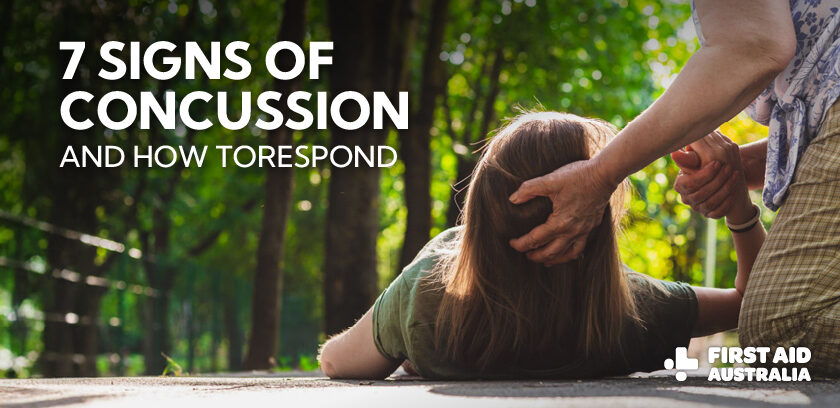The First Aid Australia News+
7 Signs of Concussion and How to Respond
- April 4, 2025
- Posted by: Heber Duran
- Category: First aid First Aid Myth Busters News

A bump to the head can seem minor, but sometimes it can lead to a concussion. Whether from a fall, a sporting accident, or a car crash, a concussion is a type of traumatic brain injury that needs proper attention. Recognising the signs of concussion early and knowing first aid to treat a head injury can make all the difference in recovery. In this guide, we’ll cover the seven key signs of concussion, essential first aid steps, when to seek medical help, and the training needed to provide proper care.
Here are 7 Common Signs of Concussion
A concussion affects the brain’s function, and symptoms may appear immediately or develop over time. If you’re wondering, how can I tell if I have a concussion?, look out for these seven key signs:
1. Headache or Pressure in the Head
A persistent headache or a feeling of pressure in the head is one of the most common signs of concussion. If the headache worsens, it may indicate a more serious issue requiring medical attention.
2. Dizziness and Balance Issues
Feeling dizzy, lightheaded, or unsteady on your feet after a bump to the head can indicate a concussion. Loss of coordination or frequent stumbling may also be a warning sign.
3. Confusion and Difficulty Concentrating
Concussions often cause trouble with memory, focus, and general awareness. A person may struggle to recall what happened before or after the injury or appear dazed and disoriented.
4. Nausea or Vomiting
Feeling nauseous or vomiting after a cause of concussion (such as a fall or sports injury) is a serious symptom that should not be ignored. Repeated vomiting requires immediate medical attention.
5. Sensitivity to Light and Noise
Many people with a concussion experience increased sensitivity to bright lights and loud noises. This can lead to discomfort in everyday environments and may persist for several days.
6. Mood Changes or Irritability
A person with a concussion may feel unusually irritable, anxious, or emotional. Mood swings and changes in behaviour can be subtle but are a sign of altered brain function.
7. Drowsiness or Difficulty Waking Up
Excessive fatigue, trouble staying awake, or difficulty waking up after a head injury can indicate a more severe problem. If someone becomes increasingly drowsy, seek medical help immediately.
First Aid for Concussion
Providing first aid for concussion promptly can prevent complications and help ensure a smoother recovery. After DRSABCD, consider the following if you suspect a concussion:
-
Ensure Safety – Move the injured person to a safe area away from potential hazards.
-
Encourage Rest – Keep them calm and limit movement. Avoid activities that require focus, such as using screens or reading.
-
Apply a Cold Pack – Place an ice pack (wrapped in a cloth) on the head to reduce swelling.
-
Monitor Symptoms – Watch for worsening signs over the next 24 hours.
-
Avoid Painkillers – Do not give aspirin or ibuprofen immediately unless advised by a doctor.
-
Do Not Leave Them Alone – Have someone stay with the injured person to ensure their condition does not deteriorate.
Knowing how to treat concussion correctly can prevent further harm and promote recovery.
When to Seek Medical Help
While some concussions can be managed at home with rest, certain symptoms require urgent medical attention. If you’re asking, when should I see my doctor?, seek medical help immediately if the injured person:
-
Has a worsening or severe headache
-
Vomits repeatedly
-
Experiences seizures or convulsions
-
Has trouble speaking or slurred speech
-
Shows weakness, numbness, or lack of coordination
-
Has difficulty waking up or remains drowsy
-
Exhibits unusual behaviour or mood changes
A doctor may conduct a physical exam, neurological tests, and cognitive assessments to determine how is concussion diagnosed and recommend appropriate treatment.
What First Aid Training is Needed to Provide First Aid for a Head Injury?
Basic first aid for concussion knowledge is valuable, but formal training ensures you can respond effectively in emergencies. First aid training courses cover:
-
Recognising signs of concussion
-
Correct procedures for how to treat a head injury first aid
-
When to call emergency services
-
How to monitor symptoms over time
-
Return-to-activity guidelines for concussed individuals
We offer accredited first aid courses which teach these skills. Having up-to-date first aid knowledge can make a difference in managing a head injury safely.
Conclusion
Recognising the signs of concussion and responding appropriately is crucial for recovery and preventing complications.
Knowing how to treat concussion with proper first aid for concussion and seeking medical help when necessary ensures the best possible outcome.
For those wanting to be prepared, taking a first aid course can provide the skills needed to respond effectively in any situation. Check out First Aid Australia’s courses here – https://firstaidaustralia.com.au/courses/
And for premium First Aid Kits and the best prices visit First Aid Kits Australia
Author:Heber
Leave a Reply Cancel reply
You must be logged in to post a comment.